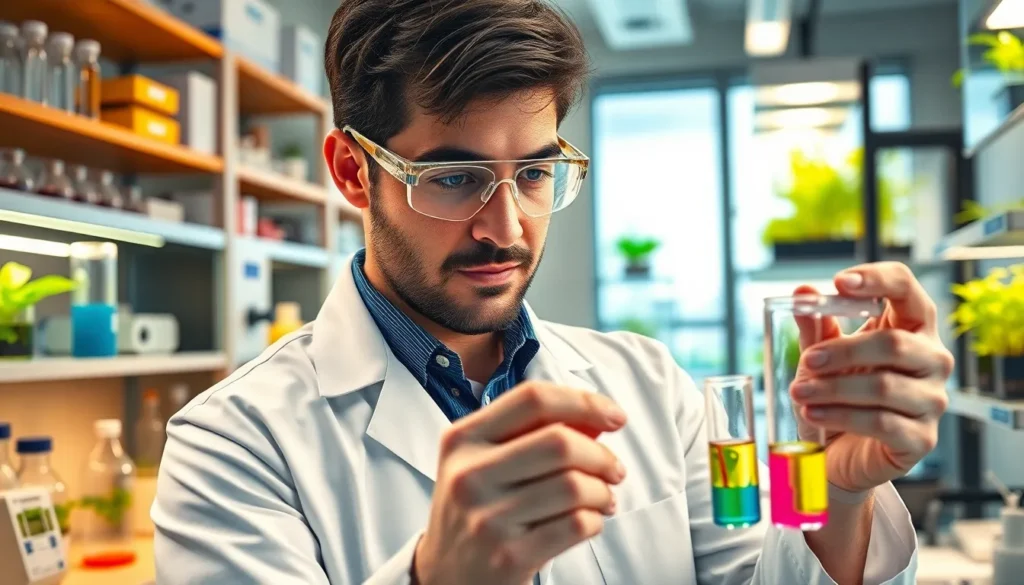Table of Contents
ToggleIn a world where science fiction often blurs into reality, biotechnological advances are leading the charge. From genetically modified crops that could feed the masses to groundbreaking medical therapies that might just turn back the clock on aging, the possibilities seem endless. It’s like watching a superhero movie unfold, but instead of capes, scientists sport lab coats and safety goggles.
Biotechnological Advances: An Overview
Biotechnological advances significantly shape various sectors, from agriculture to medicine. Transformative innovations such as genetically modified organisms (GMOs) improve crop resilience against pests and environmental stressors. These modifications enhance yield, which addresses global food shortages and supports sustainable farming practices.
In medicine, gene editing techniques like CRISPR-Cas9 allow for precise modifications of DNA. Such advancements enable targeted treatments for genetic disorders. Researchers employ these technologies to develop therapies that could reverse aging processes, increasing longevity and improving quality of life.
Synthetic biology emerges as a powerful tool for creating novel organisms. This field combines biology and engineering principles, facilitating the design of microorganisms that produce biofuels or pharmaceuticals. These applications contribute to more sustainable energy sources and advanced healthcare solutions.
Advances in biomanufacturing enhance production efficiency in pharmaceuticals. These developments lower costs and improve drug accessibility for patients. Real-time data analytics and automation streamline processes, resulting in faster and higher-quality outputs.
Environmental biotechnology plays a crucial role in waste management and pollution reduction. Techniques such as bioremediation utilize microorganisms to degrade environmental contaminants, restoring ecosystems. Innovations in this area ensure healthier environments and promote conservation efforts.
Both agricultural and medical biotechnologies depend on collaboration across disciplines. Scientists, engineers, and policymakers work together to address ethical considerations and regulatory frameworks. Such cooperation promotes safe application and public acceptance of biotechnological innovations.
Key Areas of Biotechnological Advances

Biotechnology plays a crucial role in various sectors. These key areas highlight significant advancements reshaping the modern landscape.
Medical Biotechnology
Medical biotechnology focuses on improving health outcomes. Techniques like gene therapy and CRISPR-Cas9 enable targeted treatments, addressing genetic disorders effectively. Stem cell research presents promising avenues for regenerative medicine, allowing damaged tissues to heal. Innovative vaccines, like mRNA vaccines, showcase rapid development facilitated by biotechnology. These advances significantly enhance patient care, making therapies more precise and tailored to individual needs.
Agricultural Biotechnology
Agricultural biotechnology enhances food production and sustainability. Genetically modified organisms (GMOs) improve crop resilience against pests and environmental stress, which boosts yields significantly. Innovations in plant breeding techniques enable the development of crops with enhanced nutritional properties. These advancements also support sustainable farming practices, reducing the reliance on chemical fertilizers and pesticides. The incorporation of biotech in agriculture directly addresses global food security challenges.
Industrial Biotechnology
Industrial biotechnology focuses on sustainable production processes. Biomanufacturing techniques utilize microorganisms for producing bio-based products, reducing reliance on fossil fuels. Enzymes developed through biotechnology streamline various industrial processes, enhancing efficiency while decreasing environmental impacts. The use of bioplastics represents a significant shift toward sustainable materials within various industries. Overall, industrial biotechnology fosters innovation while promoting environmental sustainability, driving economic growth.
Emerging Technologies in Biotechnology
Emerging technologies in biotechnology promise remarkable advancements across various sectors. Innovations focus on precision and sustainability, reflecting a commitment to improving health and food security.
Gene Editing Techniques
CRISPR-Cas9 represents a groundbreaking gene editing tool that enables precise modifications of DNA sequences. This technique allows scientists to target specific genes, addressing genetic disorders with unprecedented accuracy. Researchers utilize CRISPR in developing therapies that potentially reverse aging processes. Moreover, advancements continue in base editing and prime editing, which enhance the efficiency and reduce off-target effects associated with gene editing. These developments not only bring hope for curing inherited diseases but also pave the way for advances in personalized medicine.
Synthetic Biology
Synthetic biology integrates engineering principles with biology to create new biological parts, devices, and systems. This field seeks to design organisms that can produce sustainable products, such as biofuels and pharmaceuticals. Innovative applications of synthetic biology support environmental initiatives, including carbon capture technologies. Factories built on synthetic biology principles can replicate complex biological processes, improving efficiency in production. Researchers increasingly explore pathways for creating custom organisms that can address specific challenges in health care and energy sectors.
Impact of Biotechnological Advances
Biotechnological advances impact multiple sectors significantly, fostering sustainability and economic development. They address pressing global challenges, including environmental issues and economic growth.
Environmental Benefits
Biotechnology plays a crucial role in improving environmental health. Techniques like bioremediation utilize microorganisms to clean up contaminated sites, reducing pollutants effectively. Genetically modified organisms enhance agricultural sustainability by increasing crop resistance to pests and diseases. These innovations facilitate reduced pesticide usage, promoting biodiversity and ecosystem health. Furthermore, biotechnological methods contribute to the development of biofuels, which provide renewable energy sources and lower greenhouse gas emissions. The integration of biotechnology in environmental solutions leads to a more sustainable future, where ecosystems thrive alongside human advancements.
Economic Growth
Biotechnological innovations drive significant economic growth in various industries. Investments in biotech startups have surged, enhancing job creation and fostering entrepreneurship. Industrial biotechnology’s efficiency contributes to reducing production costs in pharmaceuticals and agriculture, promoting profitability. Furthermore, advancements in biomanufacturing streamline processes, allowing for the scalable production of essential goods. The economic benefits extend into healthcare; personalized medicine improves patient outcomes while potentially lowering long-term healthcare costs. Overall, the continuous evolution of biotechnological advancements fuels economic expansion, generating opportunities and enhancing societal welfare.
Ethical Considerations of Biotechnological Advances
Ethical considerations in biotechnological advances demand critical examination, particularly in areas like genetic modification and synthetic biology. Concerns regarding the safety and long-term effects of GMOs on ecosystems arise, suggesting a need for rigorous testing and monitoring. The potential for unintended consequences in gene editing techniques like CRISPR-Cas9 poses risks for biodiversity and societal health.
Stakeholder engagement plays a crucial role in addressing these concerns. Public opinion influences regulatory frameworks, which shape the application of biotechnological innovations. Transparency in research and communication fosters trust and encourages informed decision-making among citizens and policymakers.
Moreover, equity in access to biotechnological advancements ensures that benefits reach diverse populations. Disparities in healthcare access could widen if innovative therapies and treatments are unequally distributed. Providing equitable solutions becomes essential for achieving social justice in health outcomes.
Moral dilemmas arise in areas such as designer genes and genetic enhancement. The pursuit of superior genetic traits might create ethical tensions surrounding the definition of normalcy and human enhancement. Society must evaluate the implications of modifying human genetics and the impact on individual identity.
Collaboration among scientists, ethicists, and policymakers aids in navigating these ethical waters. Establishing comprehensive guidelines and ethical frameworks ensures that biotechnological innovations support public welfare while upholding human rights. As biotechnology advances rapidly, continuous dialogue is necessary to balance innovation with ethical responsibility.
Biotechnological advances are reshaping the landscape of agriculture, medicine, and environmental sustainability. With innovations like CRISPR-Cas9 and GMOs leading the charge, these technologies promise to enhance food security and improve health outcomes. The synergy between science and engineering is paving the way for sustainable solutions that address global challenges.
As these advancements evolve, the importance of ethical considerations and public engagement cannot be overstated. Collaboration among stakeholders is essential to navigate the complexities of biotechnology while ensuring equitable access and safety. The future of biotechnology holds great potential, driving economic growth and enhancing overall societal welfare. Embracing these innovations responsibly will be crucial for a sustainable and prosperous future.




